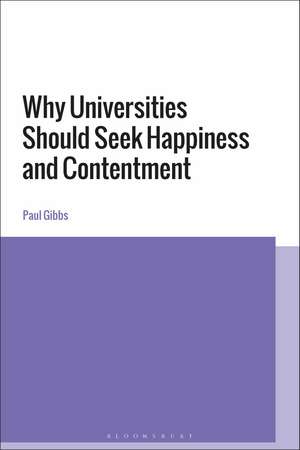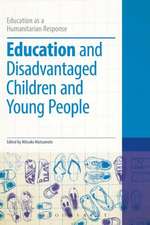Why Universities Should Seek Happiness and Contentment
Autor Professor Paul Gibbsen Limba Engleză Paperback – 20 feb 2019
| Toate formatele și edițiile | Preț | Express |
|---|---|---|
| Paperback (1) | 169.25 lei 3-5 săpt. | +20.40 lei 7-11 zile |
| Bloomsbury Publishing – 20 feb 2019 | 169.25 lei 3-5 săpt. | +20.40 lei 7-11 zile |
| Hardback (1) | 773.39 lei 6-8 săpt. | |
| Bloomsbury Publishing – 23 aug 2017 | 773.39 lei 6-8 săpt. |
Preț: 169.25 lei
Nou
Puncte Express: 254
Preț estimativ în valută:
32.40€ • 33.32$ • 26.88£
32.40€ • 33.32$ • 26.88£
Carte disponibilă
Livrare economică 28 ianuarie-11 februarie
Livrare express 14-18 ianuarie pentru 30.39 lei
Preluare comenzi: 021 569.72.76
Specificații
ISBN-13: 9781350100657
ISBN-10: 135010065X
Pagini: 248
Dimensiuni: 156 x 234 x 14 mm
Greutate: 0.35 kg
Editura: Bloomsbury Publishing
Colecția Bloomsbury Academic
Locul publicării:London, United Kingdom
ISBN-10: 135010065X
Pagini: 248
Dimensiuni: 156 x 234 x 14 mm
Greutate: 0.35 kg
Editura: Bloomsbury Publishing
Colecția Bloomsbury Academic
Locul publicării:London, United Kingdom
Caracteristici
Opens much needed debate about the structuring of higher education, often hidden beneath the guise of consumerism, market forces, commodification and training regimes
Notă biografică
Paul Gibbs is Professor of Education and Research Director of the Centre for Education Research and Scholarship at Middlesex University, UK. He has written widely on higher education matters ranging from pedagogy, marketing and the goal of higher education in a period of marketization.
Cuprins
Introduction Part I: Understanding Happiness and its Importance to Pedagogy1. A History of What Happiness Is and for Whose Benefit2. Why Hedonism and Well-being are Not Sufficient3. East Meets West in Harmony and Contentment4. Taking a Stance - Where Happiness and Being IntertwinePart II: Happiness and Higher Education - A Goal or a Process5. Higher Education and Happiness - How Do They Mix?6. The University as a Happy Place and Time7. Higher Education Students' Experience 8. Help in Finding a Place in the World Where One Can Become Content9. Replacing Fear with Anxiety in the University10. Higher Education, Policy and Managerial IssuesCoda - Reflection on the Book and its Key PointsReferencesIndex
Recenzii
This book makes a substantial contribution to the current empirical and philosophical literature not only by reframing what it means to be 'happy' and/or 'content' with one's education in terms of self-cultivation rather than desire satisfaction, but also by elucidating what a pedagogy of contentment might involve. This can be seen as a manifesto for student contentment rather than satisfaction, which should resonate with all parties involved in the HE sector.
Paul Gibbs offers an intriguing trove of conceptual adaptations, incisive observations and accessible critiques, which cumulatively serve to target the standardising bureaucracies infecting educational practices ... [His] timely book deserves wide and careful reading; it responds to the dearth of skilful, provocative and hopeful texts, and sets out to offer alternative possibilities and practices for practitioners within contemporary higher education.
Paul Gibbs tackles with verve a fascinating concept - that the University might be about more than its research productivity and graduate employability, its metrics and market position. He takes us back to Humboldt and Newman, to the debate about what are universities for, to the idea and ideal of the University.
In this restrained and highly accessible work, Paul Gibbs both develops a subtle argument about happiness as contentment and treats us to an exemplary demonstration of the contribution that philosophy can make to these important questions. Both philosophers and students of higher education can gain much from this enjoyable work but so, too, could managers, policy makers and those in the political sphere
This is a long awaited book on contentment in higher education. It covers various important problems and digs deep into the notion. Key issues are clarified with solid discussions. It is highly inspiring, and reading it is a gratifying process.
Gibbs' book is a major contribution to the field of "happiness" research. His well-researched and compelling perspective goes far beyond many popular but superficial ideas for attaining happiness. He marries highly intellectual thinking with practical ideas to urge universities to create a "pedagogy of contentment".
Paul Gibbs offers an intriguing trove of conceptual adaptations, incisive observations and accessible critiques, which cumulatively serve to target the standardising bureaucracies infecting educational practices ... [His] timely book deserves wide and careful reading; it responds to the dearth of skilful, provocative and hopeful texts, and sets out to offer alternative possibilities and practices for practitioners within contemporary higher education.
Paul Gibbs tackles with verve a fascinating concept - that the University might be about more than its research productivity and graduate employability, its metrics and market position. He takes us back to Humboldt and Newman, to the debate about what are universities for, to the idea and ideal of the University.
In this restrained and highly accessible work, Paul Gibbs both develops a subtle argument about happiness as contentment and treats us to an exemplary demonstration of the contribution that philosophy can make to these important questions. Both philosophers and students of higher education can gain much from this enjoyable work but so, too, could managers, policy makers and those in the political sphere
This is a long awaited book on contentment in higher education. It covers various important problems and digs deep into the notion. Key issues are clarified with solid discussions. It is highly inspiring, and reading it is a gratifying process.
Gibbs' book is a major contribution to the field of "happiness" research. His well-researched and compelling perspective goes far beyond many popular but superficial ideas for attaining happiness. He marries highly intellectual thinking with practical ideas to urge universities to create a "pedagogy of contentment".







